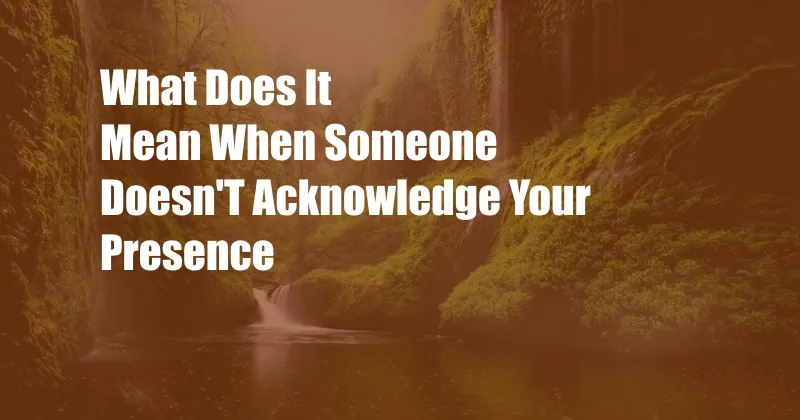
The Meaning Behind Unacknowledged Presence
Imagine this: you’ve just walked into a room, eager to greet your friends or colleagues. As you smile and wave, you realize that none of them even glance your way. Time seems to slow down as the overwhelming silence and lack of recognition wash over you. This experience can be deeply unsettling, prompting us to question both our own presence and the intentions of others.
When the World Pretends You’re Invisible
The act of not acknowledging someone’s presence can take on various forms. It could be the deliberate avoidance of eye contact, the failure to respond to a greeting, or the complete disregard for their physical presence in a space. While it can be subtle, the message it conveys is loud and clear: “You’re not important enough for me to notice.”
It’s important to note that being ignored can be a form of social exclusion or ostracism. In such cases, it’s often intentional and serves to isolate and belittle the individual. This can have severe psychological consequences, leading to feelings of low self-esteem, anxiety, and depression.
Social Psychology of Non-Acknowledgement
Research in social psychology shows that the act of acknowledging someone’s presence can have a profound impact on their well-being. Studies have demonstrated that even a simple nod or a verbal greeting can significantly boost feelings of belonging, self-worth, and overall happiness.
Conversely, being ignored or not acknowledged can have a negative effect on our mental health. As a fundamental human need, social acknowledgment helps us to feel connected, valued, and part of a community. When this need is not met, it can lead to feelings of loneliness, rejection, and even social anxiety.
Causes and Motivations Behind Ignoring Behavior
The reasons why people choose to ignore others can vary widely. In some cases, it may stem from personal biases, such as prejudice or discrimination. In other instances, it could be a form of social control or manipulation. For example, in abusive relationships, ignoring a partner’s needs or requests can be a way of asserting power and control.
Other times, ignoring behavior may simply be the result of stress, overwhelm, or preoccupation. When individuals are struggling to cope with personal issues or challenges, they may inadvertently neglect or ignore the social needs of others.
Understanding the Impact and Moving Forward
If you find yourself being ignored or not acknowledged, it’s crucial to remember that the situation is not necessarily a reflection of your own worthiness. As discussed earlier, there are various factors that can contribute to such behavior.
It’s important to approach the issue with empathy and understanding. Try to consider the other person’s perspective and potential reasons for their actions. If the situation persists, it may be helpful to communicate your feelings directly, but do so in a non-confrontational manner.
It’s also essential to focus on your own self-care and well-being. Engage in activities that bring you joy and fulfillment, and surround yourself with people who value and appreciate your presence. Remember that you are worthy of love, respect, and recognition, regardless of the actions of others.
Expert Insights and Tips for Dealing with Unacknowledged Presence
Overcoming the challenges of being ignored can be difficult, but it’s certainly possible. Here are some tips from experts in the field of psychology and interpersonal communication:
-
Communicate directly and non-confrontationally: If you’re comfortable, try to talk to the person who is ignoring you about how their behavior is affecting you. Approach them with empathy and understanding, and avoid blaming or accusing them.
-
Identify patterns and triggers: Pay attention to specific situations or behaviors that tend to trigger the ignoring behavior. This can help you to gain insight into the underlying causes and develop coping mechanisms.
-
Practice self-care and set boundaries: Prioritize your own well-being by engaging in activities that make you feel good. Establish healthy boundaries and communicate them to others to protect your emotional health.
-
Seek professional help if needed: If you’re struggling to cope with the effects of being ignored, don’t hesitate to reach out for professional help. A therapist can provide support, coping strategies, and help you to understand the underlying causes of the challenging behavior.
Frequently Asked Questions About Non-Acknowledgement
Q: Why do people choose to ignore others?
A: Reasons for ignoring behavior can include personal biases, social control, stress, or preoccupation.
Q: What are the consequences of being ignored?
A: Social exclusion or ostracism can damage mental health and lead to feelings of loneliness, rejection, and depression.
Q: How can I cope with being ignored?
A: Practice self-care, set boundaries, communicate your feelings directly, and seek professional help if needed.
Q: Is it ever justified to ignore someone?
A: Ignoring someone as a form of social control or manipulation is never justified. However, occasionally ignoring someone in certain situations (e.g., when you need to focus on a task or take a break) may be necessary.
Conclusion
The experience of being ignored or not acknowledged can be deeply hurtful and unsettling. By understanding the social psychology behind this behavior and exploring expert tips for coping, we can navigate these challenges with resilience and self-compassion. Remember, your presence matters, and you deserve to be treated with respect. If you find yourself in such a situation, don’t hesitate to seek support and prioritize your own well-being.
Call to Action: If you’ve experienced being ignored or have insights to share, please leave a comment below. Your perspective can help others who are going through similar challenges.